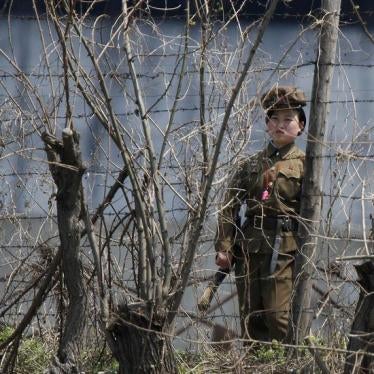(Bangkok) – The dynastic strongman of North Korea, Kim Jong-Un, consolidated his rights-abusing rule in 2013, Human Rights Watch said today in its World Report 2014. Over the past year, North Korea has tightened control over the country’s northern border to reduce flight, and has continued systematic interrogation and torture of North Koreans caught and forcibly returned from China.
The investigation by a UN Commission of Inquiry on human rights in North Korea should shed light on these and other rights crimes when it presents its report to the UN Human Rights Council this coming March.
“Kim Jong-Un has picked up where his father and grandfather left off, by overseeing a system of public executions, extensive political prison camps, and brutal forced labor,” said Phil Robertson, deputy Asia director at Human Rights Watch. “The government now recognizes that the accounts of escaping North Koreans reveal Pyongyang’s crimes – so it is doing what it can to stop people from fleeing.”
In the 667-page World Report 2014, its 24th edition, Human Rights Watch reviews human rights practices in more than 90 countries. Syria’s widespread killings of civilians elicited horror but few steps by world leaders to stop it, Human Rights Watch said. A reinvigorated doctrine of “responsibility to protect” seems to have prevented some mass atrocities in Africa. Majorities in power in Egypt and other countries have suppressed dissent and minority rights. And Edward Snowden’s revelations about US surveillance programs reverberated around the globe.
The North Korean government systematically denies basic freedoms in the country and uses detention in labor prison camps to ensure fear of opposing the government. In November, Kim Jong-Un’s public purge and execution of his uncle, Jang Song-Thaek, previously a top-level official in the government, reinforced that fear. People are publicly executed on a regular basis for vague national security crimes, including “crimes against the state” and “crimes against the people,” as well as a gamut of nonviolent offenses such as fraud and smuggling if the authorities deem the offense as “extremely serious.”
The North Korean government continues to practice collective punishment, sending not only an offender but also three generations of his family to political prison camps, known as kwan-li-so. These camps are notorious for horrific living conditions and abuse, including induced starvation, lack of medical care, proper shelter and clothes, torture and abuse by guards, and continuous forced labor in highly dangerous conditions.
Former North Korean security officials told Human Rights Watch that North Koreans who are caught in China are systematically interrogated and tortured, and those found to have had contact with South Koreans faced being sent to a kwan-li-so, while others judged to be a lesser risk are send to penitentiaries (kyo-hwa-so) or other types of forced labor camps.
Despite having ratified several core UN human rights treaties, North Korea continues to systematically repress core civil and political rights, such as freedom of association, assembly, and expression, and target those involved in religious activities. Labor rights are systematically suppressed and North Korea is one of the few states in the world that has refused to join the International Labor Organization (ILO). Access to adequate food, medical care, education, and other services remains limited, especially for the majority of people who are not in the core “loyal” class under the government’s songbun classification system.
“The fiction that Kim Jong-Un might be somehow more moderate because of his education in Switzerland has been thoroughly refuted by the continued brutality of the government he now leads,” Robertson said. “Human rights need to be front and center in all international dealings with North Korea, starting with demanding accountability for crimes against humanity.”







